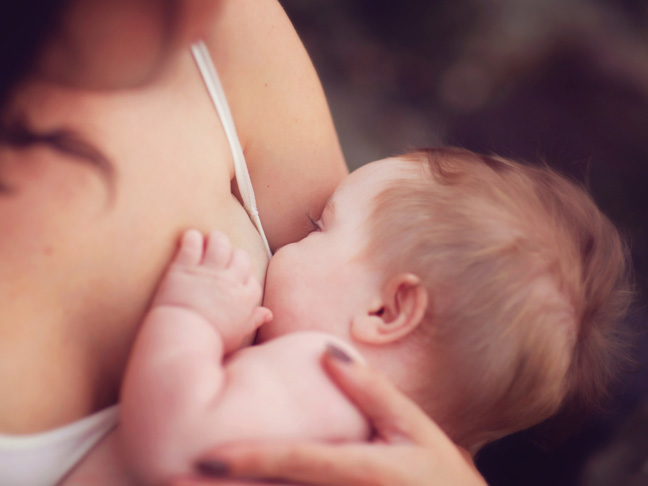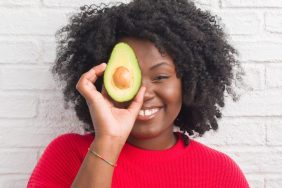Following a breastfeeding diet is pretty important. See, you’ll need to know what foods to avoid while breastfeeding, as well as what foods to eat while breastfeeding, to help you produce the best, most nutritious breast milk for your baby. To get the lowdown on what nutrients breastfeeding moms need, I talked to the pros. Think of this as the ultimate breastfeeding diet.
1. Eat a well-balanced diet. Clean, whole foods — preferably organic and local when possible — are the way to go when you’re following a breastfeeding diet, says Stacey Capobianco, a board certified health coach in Brooklyn, New York. “Cook proteins such as wild-caught salmon, which has beneficial omega 3 fatty acids, and beans, which contain iron, folate, calcium, and zinc.” Incorporate a rainbow of fruits and veggies into your diet, and vary your cooking method as well, she adds. “Eat some vegetables raw, sautéed, steamed, and roasted.”
2. Make sure that your breastfeeding diet includes these essential vitamins and nutrients:
Calcium is necessary for healthy bones, muscles, and nerves. You should get 1000 milligrams of calcium per day from foods such as cheese, yogurt, milk, beans, fish, and tofu.
Magnesium is important for muscle and nerve function, as well as for maintaining healthy blood sugar levels and blood pressure. Breastfeeding moms should get about 350 milligrams daily. Good sources of magnesium include nuts, seeds, beans, whole grains, green vegetables, scallops, and oysters.
Zinc helps your immune system function well. You should get about 12 milligrams a day from foods such as beef, lamb, pork, poultry, seafood (especially oysters), eggs, seeds, beans, and yogurt.
Folate (aka folic acid) will help you avoid anemia. Breastfeeding moms should get 500 micrograms daily by eating green leafy vegetables, beans, seeds, eggs, and fortified breakfast cereals.
Many of these nutrients are already in your prenatal vitamin, which you should continue to take, says Sharon Mass, MD, a member of the American College of Obstetricians and Gynecologists’ Breastfeeding Expert Working Group. She also says you may need extra vitamin D if you don’t get enough (about 20 minutes of sunshine per day), as well as B12 if you’re a vegetarian or a vegan. Consult your doctor if you have concerns.
Related: How I’m Dealing with My Breastfeeding Baby’s Cow’s Milk Allergy
3. Eat healthy snacks. Nursing moms should consume an additional 500 calories a day, which is the equivalent of an apple and a handful of almonds as a morning snack, and a couple of tablespoons of hummus with pita and carrots in the afternoon, says Eileen Behan, RD, a member of Core Physicians in New Hampshire and author of Eat Well, Lose Weight, While Breastfeeding. To ensure you’re getting your extra nutrients from healthy foods, Capobianco suggests stocking your pantry and fridge with nuts, seeds, organic cheeses, hard-boiled, free-range eggs, and avocados.
4. Drink plenty of water. Your breastfeeding diet should include 6 to 8 glasses of water, juice, milk, and/or herbal tea per day. One way to measure if you’re drinking enough, according to Dr. Mass, is by the color of your urine; pale yellow is best!
5. Foods to avoid while breastfeeding:
Don’t drink more than a glass or two of wine. Alcohol passes into breast milk. “It takes about two hours for your body to metabolize the alcohol from a typical alcoholic beverage, so it’s important to time your feedings accordingly,” says Dr. Mass.
Don’t consume too much caffeine. Try to stick to one cup of coffee a day — two at most, says Dr. Behar. “Drinking more than two cups of coffee a day may affect how well your baby sleeps,” she explains. Remember, chocolate has caffeine, too.
Don’t eat fish that’s high in mercury, such as swordfish, shark, and tilefish. Better choices include salmon, shrimp, and cod. High mercury levels aren’t healthy for you or your baby.
It might seem like there’s a lot to remember when it comes to following a breastfeeding die. Really though, it’s the way you should eat all the time. Following a healthy diet should become second nature over time (if it isn’t already). Dr. Behan reminds us that, as new moms, it is important to take stock of our eating habits. “Within a year your child will be eating as you do, so set a good example,” she says.
More on Breastfeeding:
- 21 Things Only Moms Who Breastfeed Know
- How To Stop Breastfeeding
- Best Breast Pumps for Every Lifestyle, According to Lactation Consultants
- Breastfeeding in Public: Tips from Moms Who Are Pros at It
Photo: Getty








